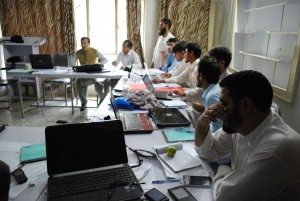FLI is first of its kind in the region addressing languages and multilingual education. During the last few years FLI has made some good progress towards its goals. Below a number of specific achievements of FLI are highlighted:
- Enhanced awareness among indigenous communities regarding the importance of mother tongues.
- Built the capacity of government and private school teachers in teaching newly introduced mother tongue subjects in KP provinces.
- Motivated 23 communities to establish Community Based Organizations (CBOs) to provide an organized platform for language development work within their communities.
- Developed 11 PC and 15 Android keyboards for indigenous language communities, enhancing the usage of mother tongues in digital devices, especially in social media.
- Contributed to the recognition of indigenous languages at the institutional level, including universities, to support language documentation work and their inclusion in courses.
- Resolved inconsistencies in textbooks developed by the KP government for Pashto, Hindko, Saraiki, and Khowar by building the capacity of book reviewers.
- Assisted 11 indigenous language communities in resolving their orthography issues and developed new orthographies for 07 languages of northern Pakistan.
- Trained hundreds of people in language documentation from 26 indigenous language communities of northern Pakistan.
- Published and supported in publishing 72 books in and about the indigenous languages and cultures of northern Pakistan.
- Supported the initiation of a mother tongue-based preschool educational program in six indigenous language communities.
- Connected local researchers from target communities to collaborate on their lesser-known languages through workshops, seminars, and conferences.
- Raised awareness among 15 target indigenous language community members regarding protection from COVID-19 by disseminating messages in their mother tongues.
- Partnered in organizing two international academic conferences on indigenous languages in the last two years.
___________________________________________________________________
______________________________________________________________________________________
Helped in establishing Mother-Tongue Based Multilingual Education Schools
FLI helped start multilingual education (MLE) pilot projects in language communities. FLI trained people from these language communities in the areas of school management committee, curriculum development and teacher and supervisor training. A two-year curriculum for these three communities was also published by FLI. In addition, FLI helped these communities in organization development, which included finance management, project management and leadership development. It is exciting to note that approximately 75 boys and girls completed the 2-year MLE program and transitioned smoothly into the mainstream school system. Currently, FLI is engaged with another four language communities to establish MLE projects: Hindko, Khowar, Shina and Indus Kohistani.
Books in Disadvantages Languages. Published
FLI has published a number of books that highlight important linguistic or cultural features of several local communities. FLI publishes two series: one academic series called “FLI Language and Cultural Series” and another vernacular series called “Maqami zaban-o-adab ka ishati silsila” (مقامی زبان و ادب کا اشاعتی سلسلہ). These publications help raise the status of these communities.
Interlinked disadvantage Language Communities.
FLI provided a platform for the disadvantages language communities of northern Pakistan to collaborate. Training events and workshops provide opportunity for such interaction. FLI-sponsored conferences are another opportunity for collaboration across local communities. This networking of communities, NGOs and CBOs has been deemed beneficial, as information and experiences are being shared. The various communities invite one another to participate in each other’s major events which in its turn encourage mutual learning and respect.
Provided Advocacy for Language rights and multilingual education
The situation in this area is very different now compared to when FLI was founded nine years ago. FLI’s advocating for language rights and multilingual education remains effective, and FLI’s motivational activities encourage the disadvantage language communities to recognize the importance of their mother-tongues and the need for education in the different mother-tongues. People from many language communities have organized themselves into community-based organizations and started to address their community issues in an organized way. The communities are now regularly celebrating International Mother Tongue Days and International Literacy Days in their respective areas, while in the past, such kind of activities were confined to larger cities.
FLI’s awareness-raising in relation to media and the government is also very effective. FLI publications, FLI-sponsored events, the distribution of brochures and the launching of a website have created awareness about the languages of the region. Journalists are in their turn using FLI’s information for their news, views and for writing articles. s
Established Linguistic Library for Researchers
FLI has established a library of books, articles and electronic resource. The collection of printed resources now exceeds 3000 volumes; additionally, more than 1000 electronic resources are also available. These resources, which include topics like linguistics, anthropology, literacy, orthography, lexicography, training and management, are being used more and more by Pakistani and non-Pakistani researchers, trainers and consultants.
Enabled people to Document their mother-tongues.
FLI enabled people from disadvantage languages communities to document their languages, to established MLE schools and solve other issues of their mother-tongues and languages communities. FLI trained more than 30 people from a dozen languages communities in basic documentation by facilitating a one-year so-called Discovery Program. About twenty men and women from three languages communities are now engaged full-time in running mother tongue schools, and many others are engaged in dictionary making, orthography development, producing literature and in developing local organizations. Former trainees are now training many others from their own language communities.


